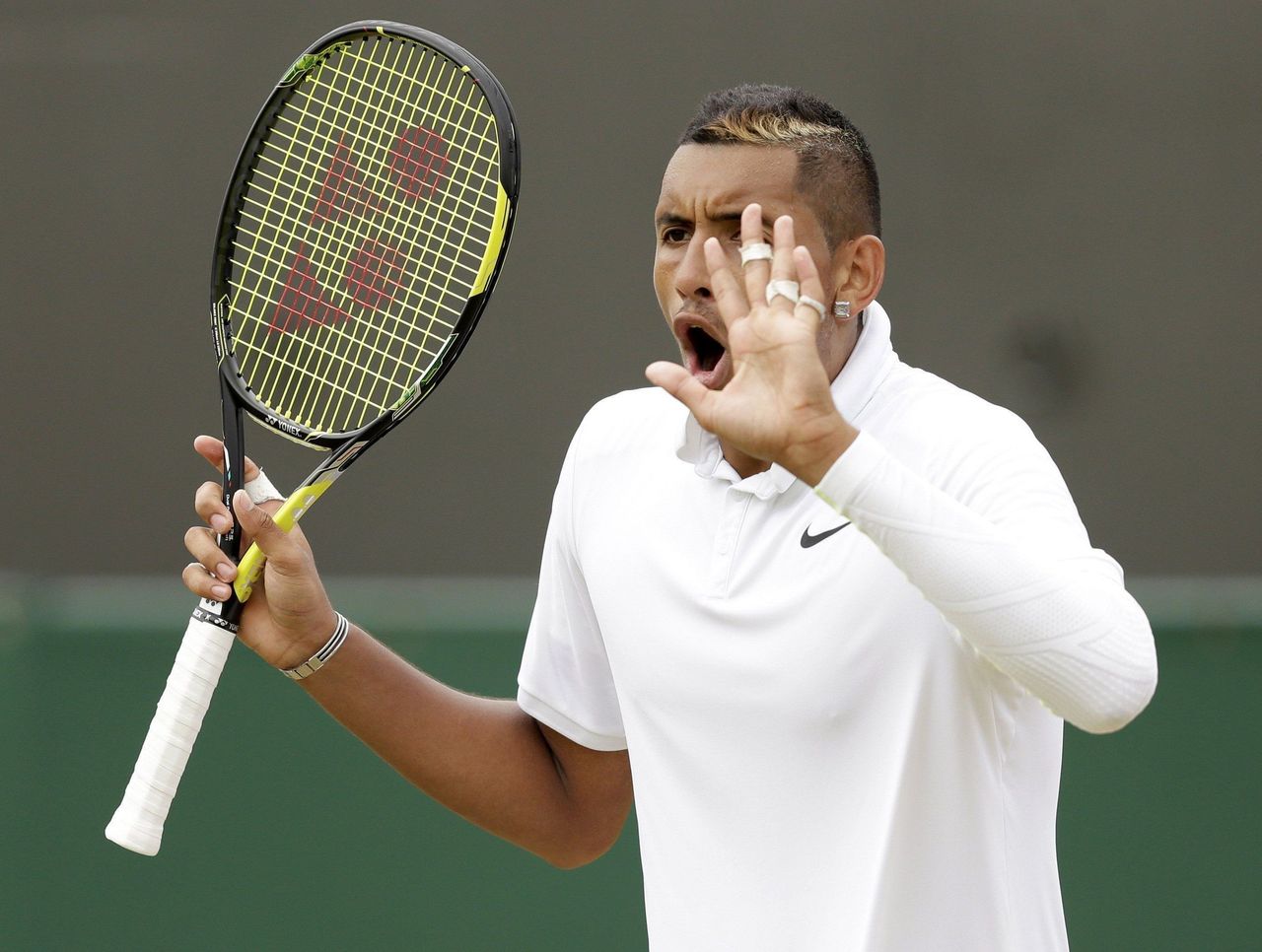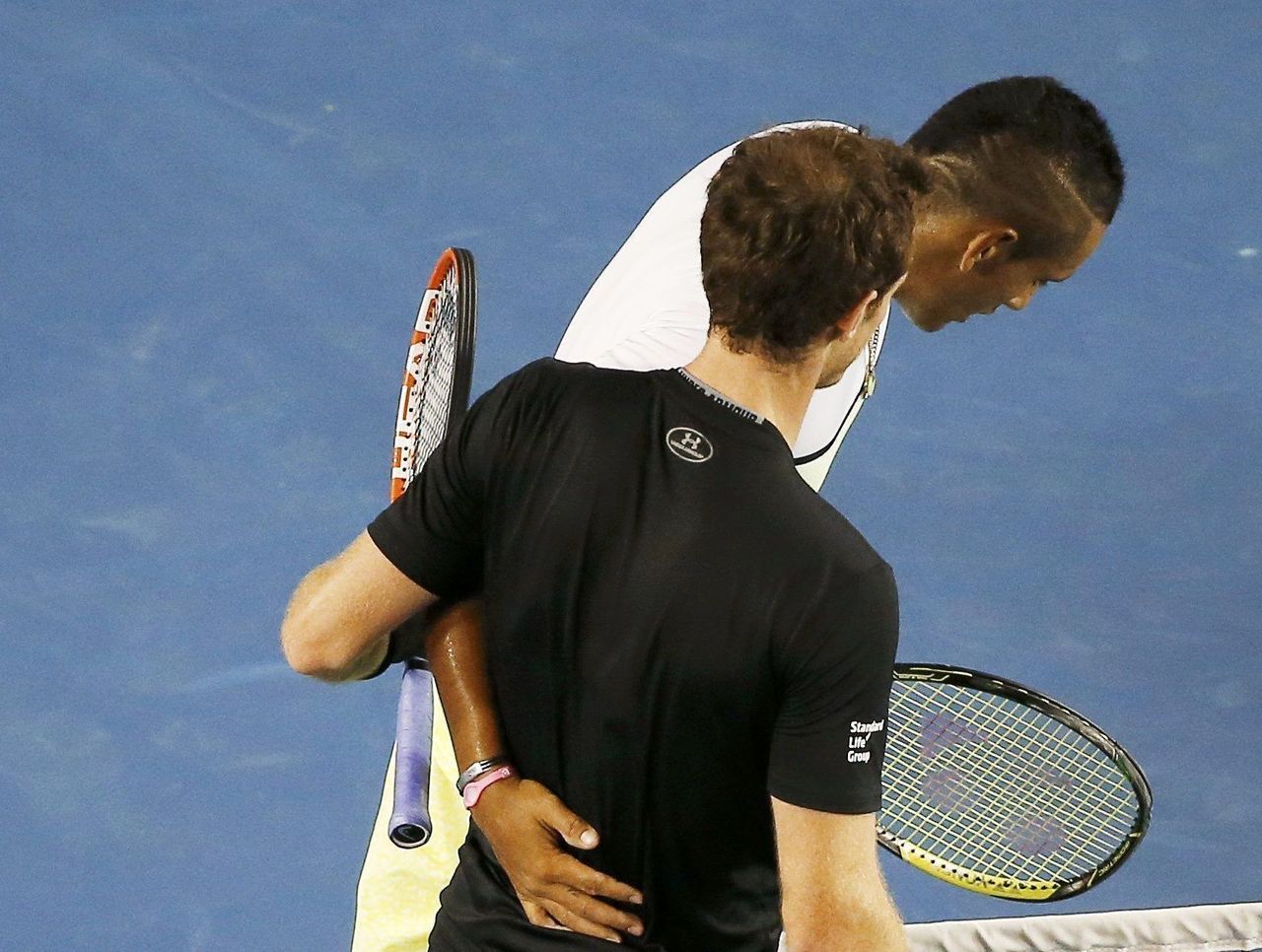Nick Kyrgios, Andy Murray, and the capacity for human growth
For someone who hasn't achieved much of note as a professional tennis player, an awful lot of ink has been spilled over Nick Kyrgios.
At 20 years old, he's already the most polarizing player in the sport, and has been since he burst onto the scene as a teenager with his upset of Rafael Nadal at last year's Wimbledon. The question nobody seems able to agree on is whether Kyrgios is good or bad. Not at tennis - for that he has the raw tools and the moxie to one day be among the world's elite is acknowledged almost universally - but for tennis.
You don't typically hear questions like this posed in other major sports. But the world of pro tennis is mired in a perpetual image crisis, forever struggling to balance its sanctimonious self-regard with a crippling inferiority complex. The reality is that Kyrgios draws attention to a sport that wants desperately to be more popular. The worry is that attention is being paid for the wrong reasons.
The young Aussie's languidly explosive hodgepodge of a game is eminently watchable in itself, but his bratty histrionics have seemingly become the bigger draw. He's berated linesmen and umpires; he's hugged a ballboy; he's obliterated rackets; he's tanked points; he's strutted and swaggered; he's chided fans and opponents; he's cursed, audibly and repeatedly, at himself, at his box, at some distant speck in the sky. His on-court behavior is as gripping and volatile as his tennis, and that's saying a lot.

The one thing everyone seems to agree on is that Kyrgios' latest stunt - an ill-considered and tasteless jab at the expense of opponent Stan Wawrinka, Wawrinka's girlfriend Donna Vekic, and fellow Australian player Thanasi Kokkinakis - crossed a line. Kyrgios was publicly excoriated, fined, and hit with a conditional 28-day suspension (which will be enforced only if Kyrgios draws a subsequent fine for verbal or physical abuse at any ATP tournament in the next six months).
And yet, it was still a little strange to hear how the incident was talked about in tennis circles, how it was still framed in relation to the game's image, and held up to a false standard.
"We're not used to that kind of talk in tennis," Roger Federer said in response. "I know in other sports it's quite common, maybe normal. Not in our sport, really."
It felt like the wrong point to make.
The player who seemed to approach the situation with the keenest sense of perspective was Andy Murray, who has often spoken fondly of Kyrgios. Certainly, among the tour's visible stars, he's been the closest thing Kyrgios has had to an ally during this whole sordid ordeal. It's not hard to see why.
Murray's been there. He's let emotions get the better of him on the court. He understands as well as anyone the feeling of playing under the weight of an entire nation's expectation before being prepared to bear it, of having one's behavior and performance nitpicked to death when one is still only half-formed. He understands how even fervent fan support can become daunting and oppressive, how the projected desperation of a country starved for a homegrown champion (no Australian-born man has won the Australian Open since 1979 - ask Murray what that's like) can make one either shut down or push back with a sort of knee-jerk rebelliousness.
"I mean, the most important thing is to try to be yourself," Murray said during this year's Wimbledon. "I think, you know, I don't think people always appreciate how difficult it is to grow up under the spotlight, how difficult it is to have loads of people expecting you to be perfect from a young age.
"I mean, you know, I like Nick. I've spoken to him away from the court. He's quite different to how he is on it."
He might as well have been talking about himself.

When it comes to life in the public eye, Murray knows external expectations tend to grossly outpace human growth, and even innocuous instances of juvenile behavior can shape the perception of someone for years. He also knows that those instances don't define who a person is, or will become.
"He's a young guy and we all make mistakes," Murray said of Kyrgios this week, to a room full of reporters. "Everyone that's here recording this, when they were 19, 20 has done some bad things and made mistakes.
"For him it happens in front of millions of people and I just think that it's wrong, a lot of the things he's done, but I also think he's still a young guy and people mature, grow up at different rates. Not everyone's exactly the same. Everyone is different. He'll learn."
Murray knows because he himself has grown up, and at his own rate. He might still rankle with his penchant for wincing and winging, for lip-flapping and hangdogging. He can still be petty, even flat-out mean. But he's also proven to be both self-aware and self-effacing. He's proven willing to make the unconventional or unpopular choice. Like becoming the men's tour's pre-eminent feminist. Or coming out in favor of Scottish independence, in the face of rebuke and ridicule from virulent English fans. Or even defending Kyrgios, when no one else seemed willing to.
We are all in constant states of becoming. Nick Kyrgios may never become anything palatable to the tennis community at large, but let's not assume he won't become someone other than who he is now. Nor should the someone he becomes have to be stuffed into a box labeled "good" or "bad" for tennis, or made to represent anything at all - be it the pride or embarrassment of a nation, or the boon or scourge of a sport. To be reminded of this, one need only ask the man standing across the net from him Tuesday evening.
That's when Kyrgios' probationary period - and his ostensible image rehab - will kick off at the US Open. Because of the man across the net, though, it's likely to be short-lived. In the most hotly anticipated matchup of the first round, he and Murray drew each other as opponents.
On the surface, there doesn't appear to be much to be excited about. They've played in two of the last three majors, and both matches were entirely devoid of drama, with Murray winning in straights in both the quarters in Melbourne and the third round in Paris. But it's what the matchup promises that stokes the fire of intrigue.
There are broad similarities in their games - Kyrgios', like Murray's, is varied and spotty, inspired but inconsistent, as often brilliant as it is infuriating - and by all accounts they should produce some thrilling (if sporadic) tennis. But it's the personal parallels that fascinate most: Of two talented, long-scrutinized, occasionally hogtied young men, one growing increasingly self-assured while the other's facade of self-assuredness grows increasingly brittle.
Those parallels have never been lost on observers. During his on-court interview after beating Kyrgios in the quarters of his home tournament in January, Murray was asked if he had any advice. Not for Kyrgios, strangely, but for the partisan fans in attendance.
"Don't put too much pressure on him," Murray said.
That elicited a faint, nervous titter from the crowd, a laugh that sounded like an impish child's when told not to do something, one that simultaneously acknowledges the wisdom of the warning and the inevitability of said warning going unheeded.
And Murray smiled a nervous half-smile, knowing his message had fallen on deaf ears.
HEADLINES
- Trust the process: Shapovalov staying on 'own path' back to the top
- Chile's Garin stops playing, loses Davis Cup match after bizarre collision
- 6 more tennis players banned for links to match-fixing syndicate in Belgium
- US Open adding 15th day by moving to Sunday start this year
- Sinner's style draws comparisons to Djokovic after Aussie Open title